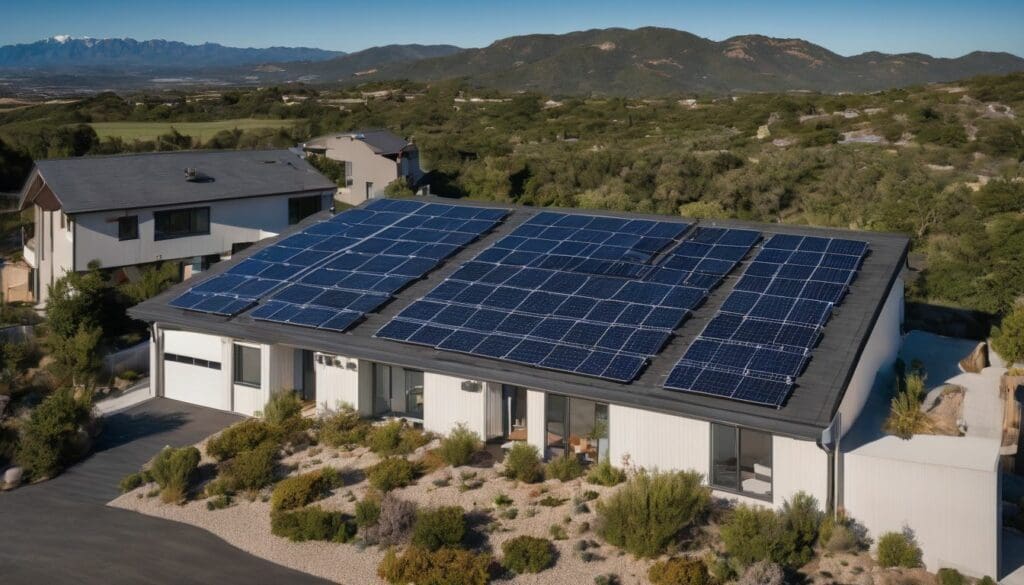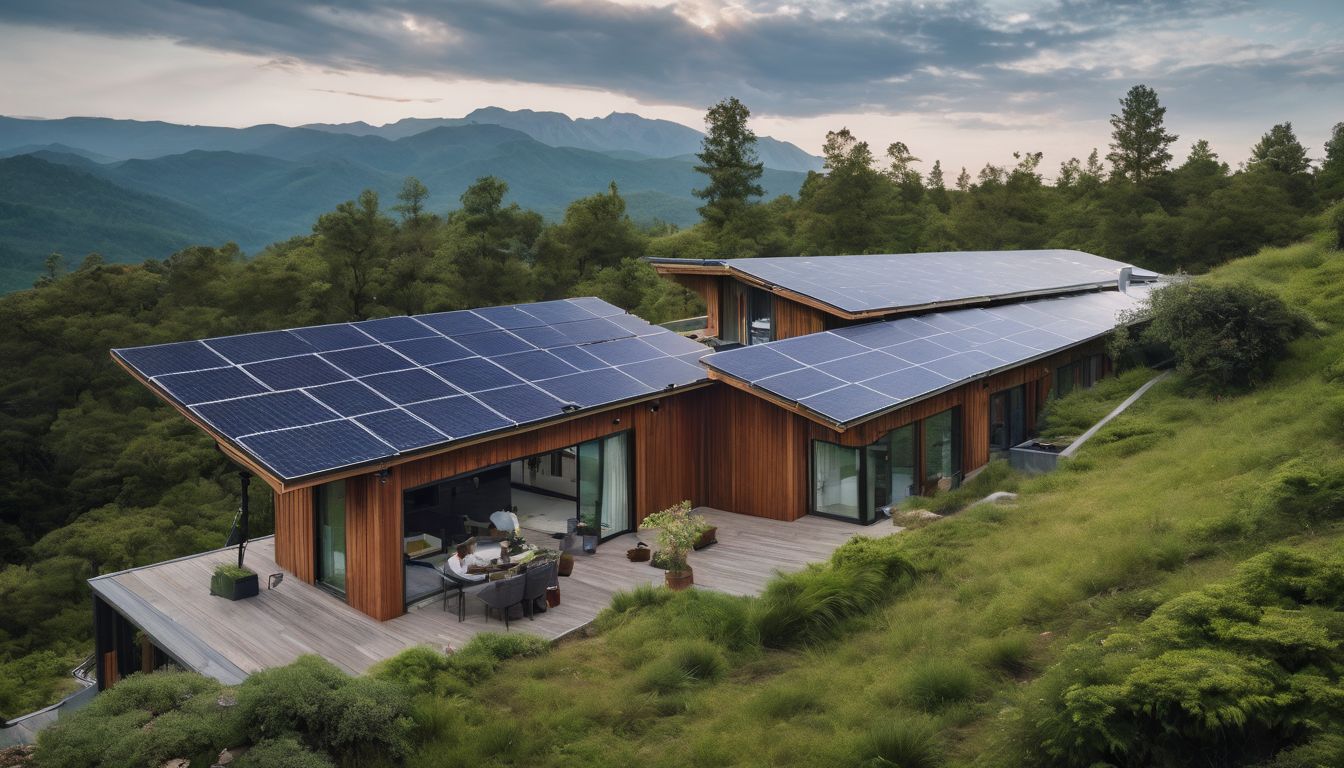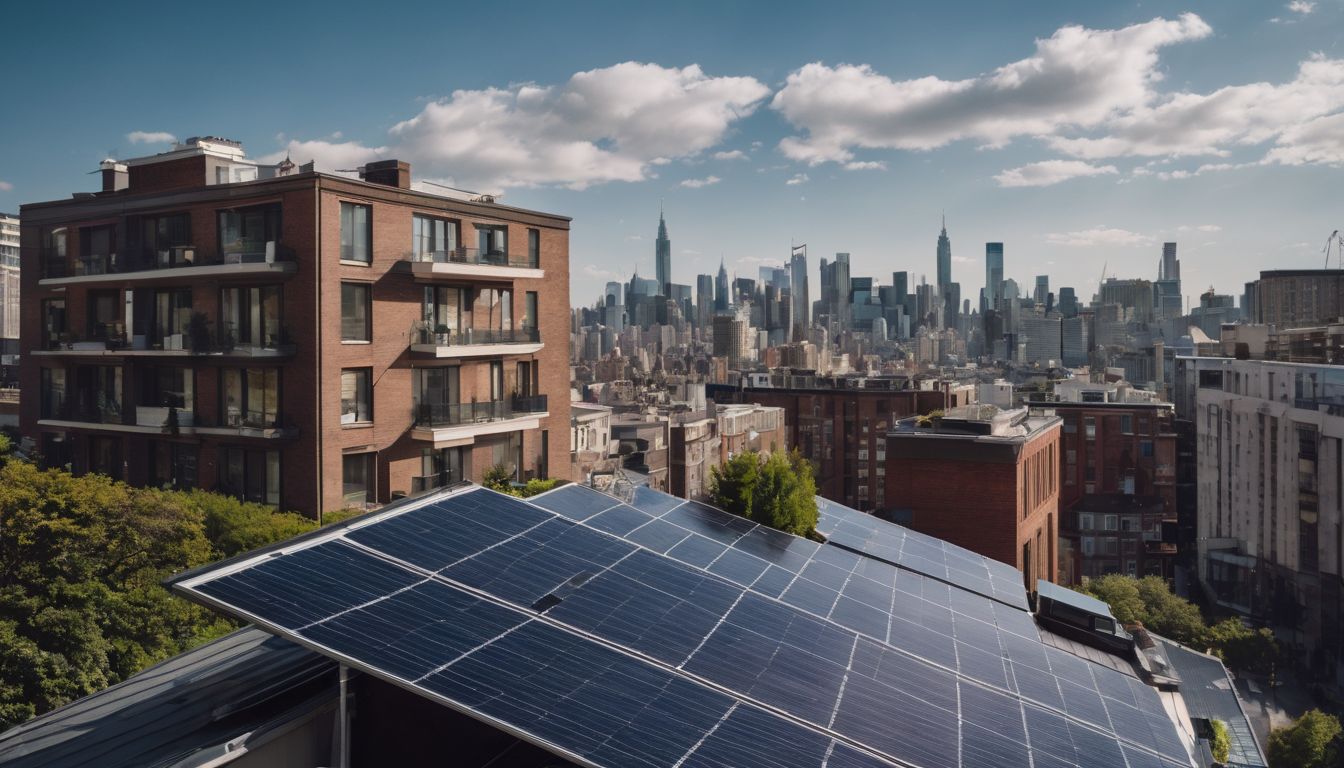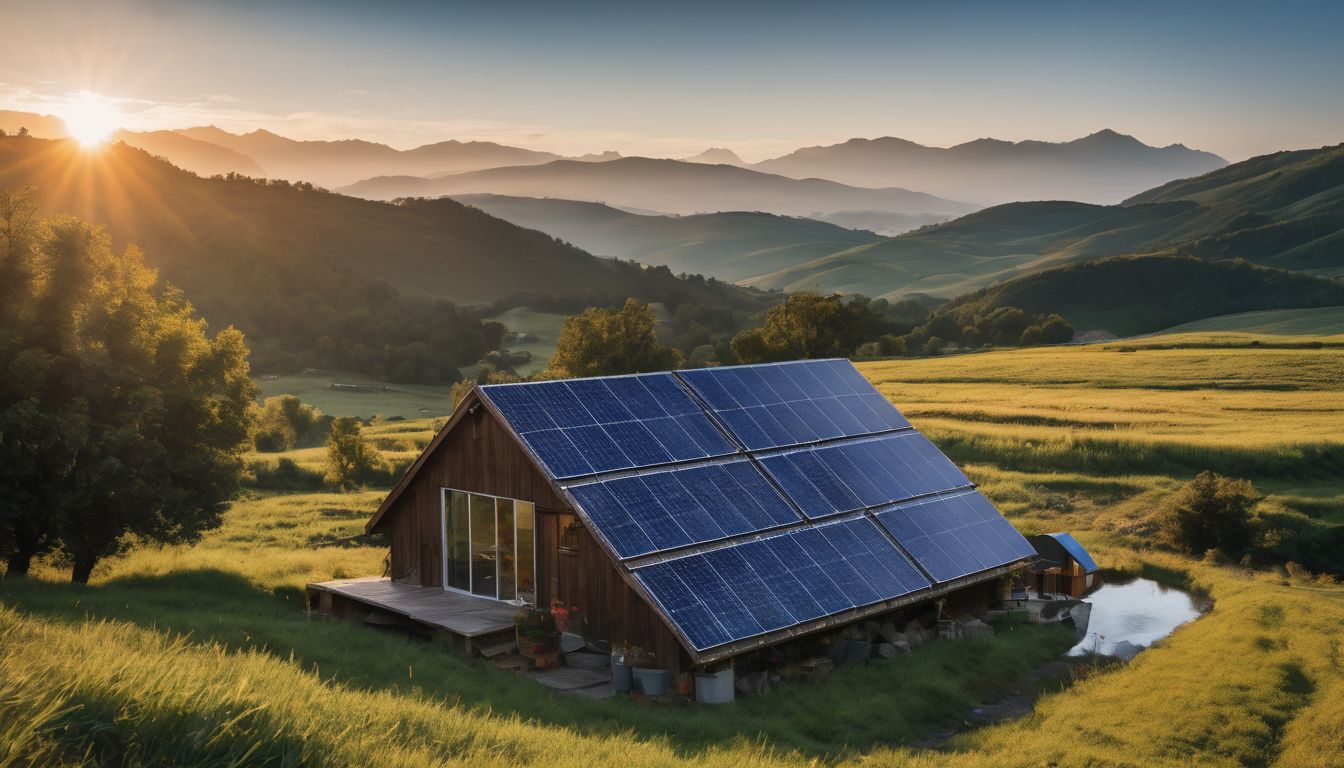Many homeowners worry about the durability of their roofs when considering solar panels. It’s a fact that installing photovoltaic panels can alter your roof’s condition. Our guide will explore how solar energy technology impacts roofing, ensuring you make an informed decision for your home and the planet.
Discover the sunny side of rooftop renewal!
Key Takeaways
- Solar panels protect roofs by reducing exposure to UV rays that can cause damage, helping to extend the roof’s lifespan.
- Proper installation and regular maintenance of solar panels are vital to prevent any potential damage and ensure the integrity of the roofing structure is preserved.
- By generating their own energy, homeowners with solar panels can cut down on electricity costs, leading to significant savings over time.
- The presence of solar panels may increase a home’s market value due to growing demand for sustainable features in properties.
- It’s important for homeowners to check if installing solar panels might void their roof warranties and work with experienced installers who utilise non-intrusive methods.
How Solar Panels are Installed
Solar panels are installed by first evaluating the structure and condition of the roof, followed by the installation of platforms for mounting, placement of solar panels, and electrical work to connect them to the home’s power system.
Evaluation of the roof
Before solar panel installation can begin, experts thoroughly inspect your roof. They check for any signs of damage or wear that could affect the installation. This is crucial for ensuring that your roof will be able to support the weight of the panels and won’t need repair in the near future.
The strength and durability of your roofing materials are assessed, alongside their estimated remaining lifespan.
Installers also consider the shape and slope of your roof, determining how many panels it can accommodate. They look at shading from trees or other buildings that might reduce efficiency.
By evaluating these factors, they tailor a setup perfectly suited to maximise energy production while safeguarding your home’s integrity. Next up is setting up a sturdy platform to securely hold those eco-friendly power generators in place.
Platform installation
Solar panels are installed on rooftops following a careful evaluation of the roof’s condition. The installation process involves securely placing platforms to support the solar panels, ensuring they can withstand environmental elements and weight.
This step is crucial to ensure the stability and longevity of the solar panel system. After platform installation, solar panels are strategically placed to maximise sunlight absorption.
Skilled electricians then handle the electrical work required for connecting the panels, completing this essential step in converting solar energy into usable power for homes.
Panel placement
After evaluating the roof and installing the platform, solar panels are carefully placed to optimise sunlight absorption. Special care is taken to ensure proper alignment and spacing of the panels for maximum energy production.
The placement of these panels involves strategic positioning to prevent any shading from nearby structures or trees, ensuring optimal efficiency.
Once panel placement is completed, electrical work connects the solar panels to your home’s electrical system. This step allows the generated electricity to power your home and reduces reliance on traditional grid electricity.
Proper panel placement maximises energy production while minimising any potential impact on your roofing structure.
Electrical work
After the solar panels are securely in place, the next step involves electrical work. This includes connecting the panels to an inverter which converts the DC power generated by the solar panels into AC power that can be used to power your home.
The inverter is then connected to your main electrical panel, allowing you to use the solar energy produced instead of drawing electricity from the grid. It’s crucial that this work is carried out by a qualified electrician to ensure safety and compliance with regulations.
Once installed, solar panels offer a sustainable energy solution with minimal impact on your roof’s integrity. Properly maintained equipment should not cause any damage or pose risks if properly inspected and serviced regularly.
Effects of Solar Panels on Roofs
Solar panels provide protection from harsh sunlight and have a cooling effect on the roof, with limited impact on its integrity. To learn more about how solar panels can benefit your roof, keep reading.
Protection from harsh sunlight
Solar panels offer effective protection from harsh sunlight, shielding the roof and underlying structure from prolonged exposure. The panels act as a barrier, reducing the direct impact of UV rays on shingles and prolonging their lifespan, thus contributing to sustainable roofing practices.
Additionally, this protection mitigates thermal stress on the roof, helping to maintain its integrity over time.
Furthermore, solar panels help regulate temperature by absorbing some of the sunlight and converting it into electricity. As a result, they create a cooling effect which can reduce energy costs for air conditioning while extending the longevity of the roof.
Cooling effect
Solar panels provide a cooling effect on roofs by absorbing sunlight and converting it into energy, which reduces the amount of heat that is absorbed by the roof. This helps in maintaining a more moderate temperature within the building, decreasing the need for excessive air conditioning and ultimately reducing energy costs.
The presence of solar panels also creates shade over the roof’s surface, lowering its exposure to direct sunlight and thereby protecting it from potential damage caused by prolonged UV radiation.
Additionally, in hotter climates, this cooling effect can significantly contribute to prolonging the lifespan of roofing materials such as shingles and tiles. As a result, homeowners may experience fewer maintenance issues related to their roofs over time due to decreased wear and tear from extreme temperatures.
Limited impact on roof integrity
Solar panels have a limited impact on roof integrity. The weight of the solar panels is distributed evenly across the roof, and modern installation methods ensure that they do not compromise the structure.
Additionally, solar panels can provide protection to the underlying roofing materials from harsh weather conditions and UV exposure.
The installation process involves evaluating and reinforcing the roof as necessary to support the additional weight without causing damage. Electrical work is done carefully to avoid any negative impact on the roof’s integrity.
Benefits of Solar Panels for Roofing
Solar panels can actually increase the lifespan of your roof while potentially increasing the value of your home. In addition, they can help reduce your energy costs and make your home more environmentally friendly.
Increased roof lifespan
Solar panels contribute to an increased roof lifespan by offering protection from the elements. The panels act as a barrier, shielding the roof from harsh sunlight and extreme weather conditions, reducing wear and tear on roofing materials.
This results in reduced maintenance requirements and extends the longevity of the roof, promoting sustainability through long-term durability.
Installing solar panels can potentially enhance home value while simultaneously contributing to environmental conservation and energy efficiency. By integrating solar technology into roofing systems, homeowners have the opportunity to not only reduce their carbon footprint but also prolong the lifespan of their roofs, creating a more sustainable living environment for future generations.
Potential increase in home value
Solar panels can potentially increase the value of a home, offering an attractive investment for environmentally conscious homeowners. The growing demand for sustainable energy solutions means that properties equipped with solar panels are highly sought after, making them more appealing to potential buyers.
This increased property value is a direct result of the long-term financial benefits and positive environmental impact associated with solar energy.
Additionally, homes with solar panels often benefit from reduced energy bills due to their ability to generate clean and renewable electricity. This cost-saving feature adds further appeal to potential buyers who are looking for eco-friendly and sustainable living options.
Reduced energy costs
When solar panels are installed, they can lead to reduced energy costs. Solar power generated by the panels can significantly lower electricity bills over time. This cost-saving benefit makes investing in solar panels a practical and financially wise choice for environmentally conscious individuals looking to reduce their carbon footprint and save on household expenses.
Moreover, harnessing solar energy reduces reliance on traditional power sources, leading to long-term savings while contributing positively towards environmental conservation efforts.
With reduced energy costs being one of the main advantages of solar panel installation, homeowners can enjoy both economical and ecological benefits while supporting green building practices and sustainable living.
Common Concerns about Solar Panels on Roofs
Many homeowners have concerns about solar panels voiding their roof warranties or causing potential damage. It’s important to address these concerns and ensure proper installation and maintenance of solar panels on roofs.
Voiding roof warranties
Installing solar panels may void the warranties of certain roofing materials. This occurs because roof warranties often exclude any alterations or installations that haven’t been approved by the manufacturer.
To avoid this issue, always check and understand your roof’s warranty terms before proceeding with a solar panel installation.
Solar panel companies are aware of this concern and offer solutions such as using non-intrusive mounting systems to minimise impacts on the roof structure. It’s crucial to consult both a reputable solar panel installer and your roofing manufacturer to ensure that the installation process does not compromise your roof’s warranty coverage.
Potential damage to roof
While solar panels offer energy efficiency, there is a potential for damage to the roof during installation. The weight of the panels and the penetrations made to secure them can compromise the integrity of the roofing structure.
In addition, improper installation or lack of maintenance could lead to leaks and water damage, ultimately impacting the longevity of your roof.
To mitigate these risks, it’s crucial to work with experienced installers who understand how to properly evaluate and reinforce your roof before installing solar panels. Regular inspections and maintenance will also help identify any issues early on, ensuring that your roof remains in good condition while benefiting from solar energy production.
Conclusion and Recommendations
In conclusion, solar panels can significantly impact roofing by providing protection from harsh sunlight and extending the roof’s lifespan. The cooling effect of solar panels also offers benefits to the overall maintenance of the roof.
Additionally, homeowners may experience reduced energy costs and potentially increase their home’s value by installing solar panels on their roofs. Understanding common concerns and seeking professional advice can help ensure successful installation and minimal impact on the roof’s integrity.
FAQs
1. How do solar panels affect the roof’s protection?
Solar panels can provide additional coverage and protect your roof from the elements, potentially extending its longevity.
2. Can installing solar panels cause damage to my roof?
Careful installation of solar panels should not harm your roof; however, if not done properly, there is a risk of damage to shingles or the roofing structure.
3. Will I need to perform extra maintenance on my roof with solar panels installed?
Regular maintenance checks are essential to ensure both your roofing and solar panel system remain in good condition and function properly.
4. What are the benefits of having solar energy for my home’s roofing?
Besides generating clean energy, adding solar panels can help reduce wear and tear on certain parts of your roof by shielding them from direct sunlight and debris.
5. Are there any risks associated with putting up solar panels on various types of roofs?
Each type of roofing has different considerations; it’s crucial to assess potential risks such as added weight or installation challenges with a professional before proceeding with a solar panel setup.





